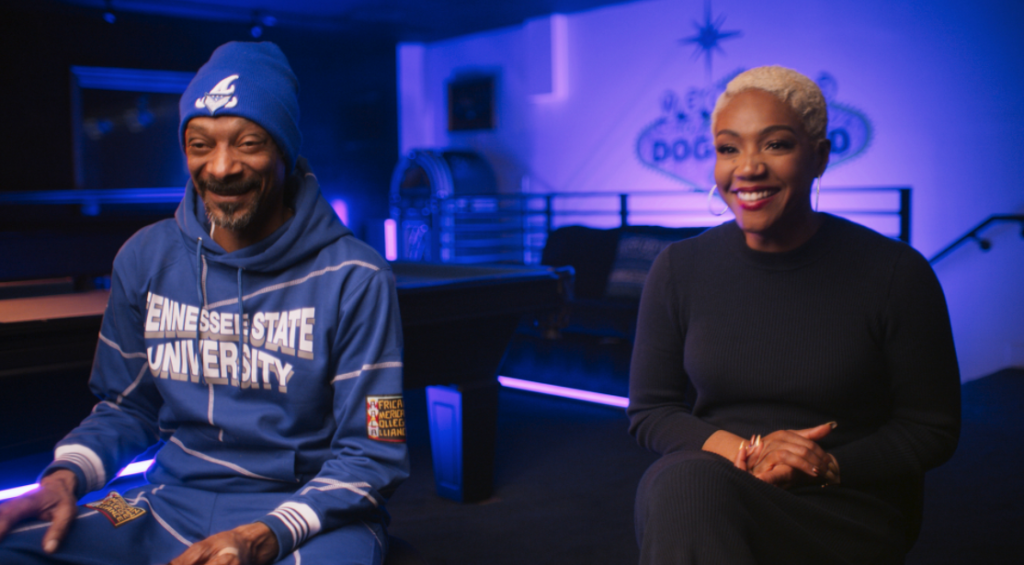Amazon’s ‘Phat Tuesdays’ : TV Review
Reginald Hudlin’s three-part docuseries fills in a key absence from Showtime’s ‘The Comedy Store,’ focusing on the all-Black standup showcase that launched in the 1990s.
By Daniel Fienberg | The Hollywood Reporter
Back in 2020, Showtime premiered Mike Binder’s five-part docuseries about Hollywood’s iconic Comedy Store. Titled, appropriately, The Comedy Store, it was star-studded and in-depth in many ways. But it was easy to sense the series’ limitations in certain areas, to identify that even in a project claiming a soup-to-nuts overview, some stories were being marginalized or ignored entirely.
Enter Reginald Hudlin’s Amazon docuseries Phat Tuesdays, which fills three hours with what feels in retrospect like a mighty telling absence from Binder’s version of Comedy Store history. It’s hard to know if Phat Tuesdays is a direct response to how myopic that series was in its examination of Black comics — specifically how the Phat Tuesdays showcase kept the club afloat for several years in the ’90s, or if there was simultaneous production on both documentaries and the directors elected to make them complementary texts. It feels like the former, because Hudlin’s series climaxes with many of the Phat Tuesdays comics lamenting their exclusion from the overall Comedy Store narrative in the form of the club’s famous wall-of-signatures.
In that respect, it’s important that Phat Tuesday gives so many of these voices their moment to shine in a personality-packed series that manages to remain thoroughly entertaining even as Hudlin generally loses focus toward the end.
For an episode-and-a-half, Hudlin expertly lays the context for Phat Tuesdays, an all-Black showcase that impresario Mitzi Shore handed to comic Guy Torry (also an executive producer here) to curate mostly in response to a dead night at the Comedy Store. Initially restricted to one of the venue’s smallest rooms — “We were like the McRib for McDonald’s. We were seasonal,” comic Aries Spears cracks — Phat Tuesdays exploded into a Los Angeles sensation, one that attracted sports stars, models and the biggest names in established comedy, helping launch countless movie and TV parts and development deals.
It’s a story that can’t be told without Hudlin touching on the pre-Phat Tuesdays Black comedy scene, including the Comedy Act Theatre (and the careers of occasionally overlooked legends like the late Robin Harris), which features the 1992 Los Angeles riots in a key role.
Like The Comedy Store, Phat Tuesdays is at its most entertaining when Hudlin simply achieves a balance between spectacular vintage standup videos and an all-star team of talking heads. It’s a great mix of A-list names recognizable to viewers of all stripes — including the likes of Chis Tucker, Steve Harvey, Cedric the Entertainer, Dave Chapelle, Anthony Anderson, Regina King and the potent pairing of Snoop Dogg and Tiffany Haddish — and standup comedy favorites like Flame Monroe and Luenell.
There’s a smart exploration of the ’90s intersection of hip-hop and standup cultures, positioning Phat Tuesdays with HBO’s Def Comedy Jam (co-creator Stan Lathan appears, but Russell Simmons, for logical reasons, does not) as twin pillars.
The comics are tremendously funny on their own and Hudlin and the series’ editors enjoy letting the ensemble go on themed runs, like all of the people recalling what they did or didn’t loot during the riots. Guy and Joe Torry are probably the centerpieces here; the strained relationship between the brothers, with its link to the end of Phat Tuesdays, provides an emotional spine along with mournful and reverential memories of Harris and, later, Bernie Mac.
The best of the talking heads are unquestionably Snoop and Haddish, who have a studied chemistry that some producer should parlay into a talk show, a movie, an Olympics commentary booth or literally anything. Watching Snoop rolling a joint and attempting not to crack up during a Haddish tale — and at least once exploding in laughter mid-inhale — is tremendous entertainment. Hudlin also captures smart and funny soundbites from the likes of Lil Rel Howrey, Tommy Davidson, J.B. Smoove and more.
The standups, many filmed on the Comedy Store stage, bring laughs, but what sets Phat Tuesdays apart for me are the less familiar faces, including hostesses, managers and security from the club, whose stories are often the raunchiest and most revealing. The presence of at least a dozen casting directors breaking down how Phat Tuesdays quickly became an essential part of their jobs was fascinating for me.
Hudlin doesn’t always make the best use of his resources. Like why have George Wallace at all if you’re only going to give him 10 seconds of screen time? And Hudlin doesn’t always have all the figures he needs to tell his story. I’d put Martin Lawrence, D.L. Hughley, Mike Epps and Chris Rock among the big names who are mentioned frequently but unseen in new material, while it might have been interesting to get somebody like Eddie Griffin (whose out-of-control sets featured in The Comedy Store as an illustration of the club’s decline) here to offer a counterpoint.
There’s some sense that the Comedy Store’s participation in the documentary — to say nothing of Pauly Shore appearing as representative of Mitzi’s legacy — was contingent on not explicitly tying the club to the most graphic descriptions of racism or misogyny.
And Hudlin doesn’t always have the best sense of structure. The first two episodes build the origins of Phat Tuesdays in a compelling and funny fashion and then the third just fizzles. The story of the end of Phat Tuesdays is nebulously told at best and the contrived reconciliation between the Torrys doesn’t feel convincing. The argument about how social media has replaced the need for showcases like Phat Tuesdays as a comedy incubator, though probably accurate, comes out of nowhere and doesn’t really go anywhere.
At least the conclusion, with the Comedy Store wall, is executed well. It left me walking away with memories of all of the talented people celebrated in the series instead of a few notes of clunkiness.

